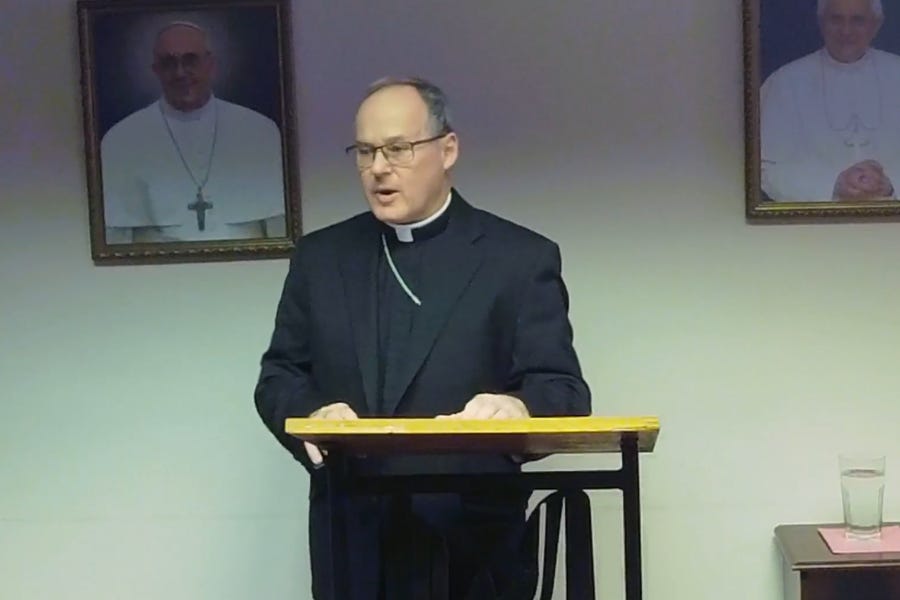Pope Francis confronts dark magic, witchcraft and violence against women in Papua New Guinea
PORT MORESBY – Those involved in helping vulnerable and abused women in Papua New Guinea are hoping that Pope Francis’s three-day visit to the country could help bring change to the insidious connection that persists between gender discrimination and superstitious beliefs around dark magic and sorcery. Belief in sorcery or witchcraft in various forms is The post Pope Francis confronts dark magic, witchcraft and violence against women in Papua New Guinea appeared first on Catholic Herald.

PORT MORESBY – Those involved in helping vulnerable and abused women in Papua New Guinea are hoping that Pope Francis’s three-day visit to the country could help bring change to the insidious connection that persists between gender discrimination and superstitious beliefs around dark magic and sorcery.
Belief in sorcery or witchcraft in various forms is deeply entrenched in areas of Papua New Guinea, including both rural and urban areas, but especially in the remote highlands, and violence related to accusations of sorcery or witchcraft is a widespread problem for the country.
It’s “dangerous”, says a local Catholic woman, “because they kill people. Very much in the highlands, especially women”.
Australia’s High Commission in Papua New Guinea conducted research in two of the country’s provinces between January 2016 and October 2017, finding that nearly one-third of roughly 150 registered cases of accusations of sorcery or witchcraft ended in violence.
Of these cases, nearly three quarters involved the torture of those who had been accused, and more than one in ten were killed, while over one third were permanently injured.
To help combat the issue, the government in 2015 developed a special program to help curb the violence resulting from allegations of sorcery or witchcraft, called the Sorcery and Witchcraft Accusation Related Violence (SARV) National Action Plan.
That plan involved providing services such as counselling, healthcare and child protection; and prevention through advocacy and communication, as well as legal protection for victims and prosecution for aggressors.
The problem of sorcery and witchcraft was addressed during a meeting between Pope Francis and local bishops, clergy and religious. A religious sister named Lorena Jenal gave a testimony about problems around beliefs in witchcraft, based on experiences at her ministry, the House of Hope, in the Diocese of Mendi, the capital of the Southern Highlands Province.
Jenal told Pope Francis that the House of Hope provides security, shelter, hope and healing for those in need due to accusations of witchcraft and sorcery.
“Unfortunately, there are practices of black magic, drug use and money laundering in our country,” she said, saying they work with local police, community leaders, family members and court officials and lawyers to protect women from false accusations and extortion.
She said that so far, they have been able to assist some 250 women and a small group of men, providing a holistic approach including counselling, therapy and also medical and financial help.
Jenal then recounted the story of a woman named Maria who came to the House of Hope in 2017, having been burnt and tortured to the point of death after being accused of witchcraft.
“We did not know if we could save her life,” Jenal said, saying the woman’s family did not visit her “due to feelings of fear and shame”, so the sisters visited the family weekly and informed them of her progress.
Eventually, Jenal said, Maria’s family realised she was innocent and understood how much she had suffered. Maria was able to return home after six months and is currently working for the House of Hope as an advocate for human rights and for the dignity and quality of women.
Pope Francis also alluded to the problem during his brief visit to the remote Diocese of Vanimo on Sunday 8 September, telling local Catholics to draw near to Jesus and to promote love wherever they go, saying this will help “to drive out fear, superstition and magic from people’s hearts, to put an end to destructive behaviours such as violence, infidelity, exploitation, alcohol and drug abuse”.
During his three-day trip, the Pope also addressed wider issues relating to women in Papua New Guinea’s society, calling for women to be respected and promoted – a message that locals hope could give momentum to slow changes occurring in society.
A woman who identified herself as Jacklyn described to journalists at the papal Mass in Port Moresby on Sunday 8 September the gradually changing situation: “In our culture, Papua New Guinea, it’s more [common that] a male [is] the chief, being the leader,” though she added that “slowly, slowly in the private sector” women are gradually finding more of a role, which she noted is also happening in the Church.
In many parishes, Jacklyn said, women are increasingly taking the initiative “because often they tend to appoint men only, they think that us ladies, we can’t lead; but if they could trust us, we can take it on and go forward with it”.
“We need someone, a leader up there, to tell the community, especially the men, to learn to trust your spouse, or your mother, or your sister, and help them if they want to go lead the crowd, just get them out there,” she said.
The fact that Pope Francis is sending this message is especially important, she said, noting that the crowd for his Mass, which authorities estimated to be at least 35,000, was a sign of the influence the Catholic Church has.
RELATED: Pope Francis flies to Papua New Guinea – and into one of the world’s most dangerous cities
Photo: A woman attends a reception for Pope Francis during a meeting with local authorities at the Government House in Port Moresby, Papua New Guinea, 7September 2024. (Photo by TIZIANA FABI/AFP via Getty Images.)
![]()
The post Pope Francis confronts dark magic, witchcraft and violence against women in Papua New Guinea appeared first on Catholic Herald.














